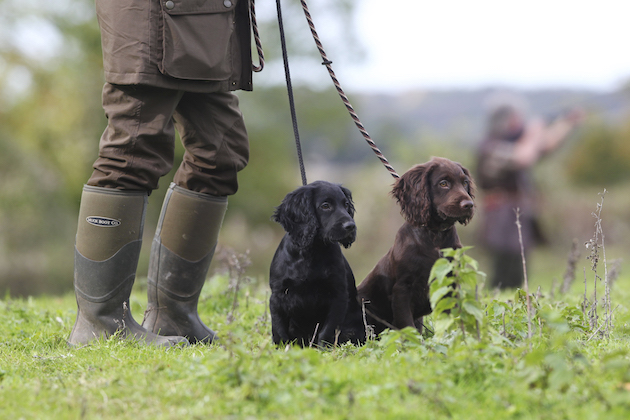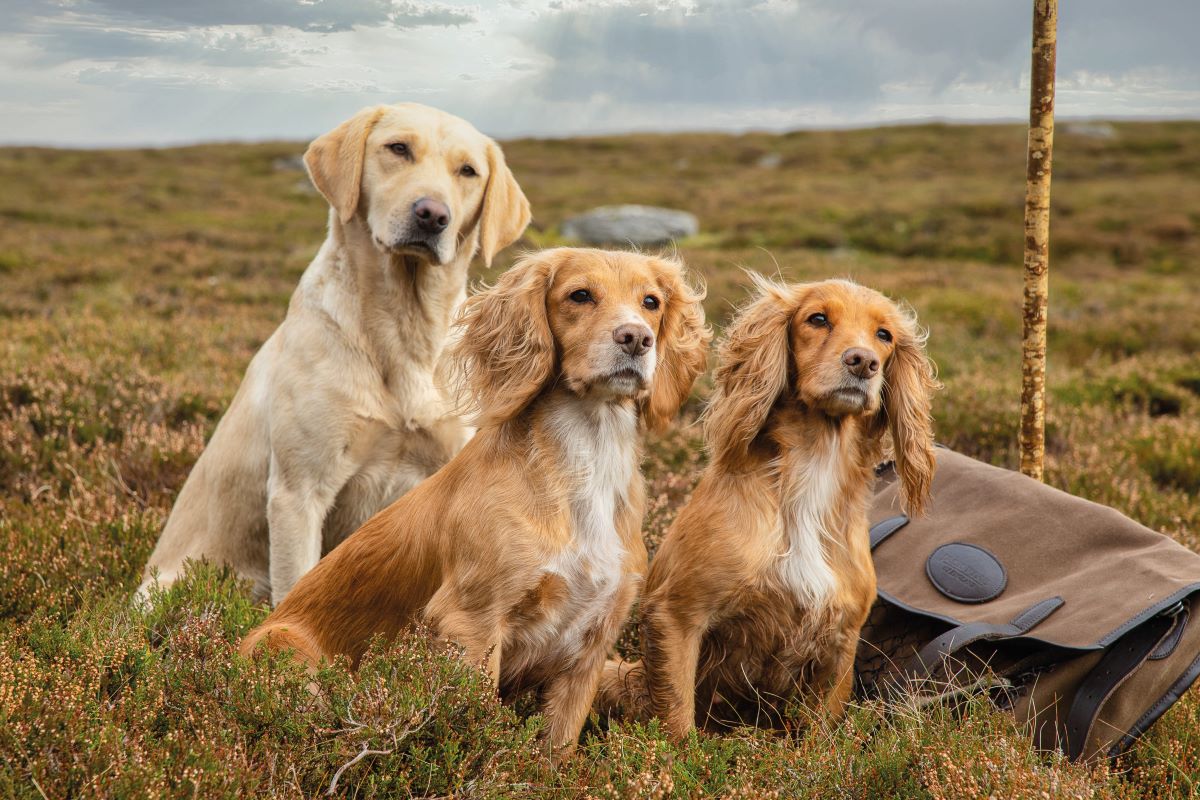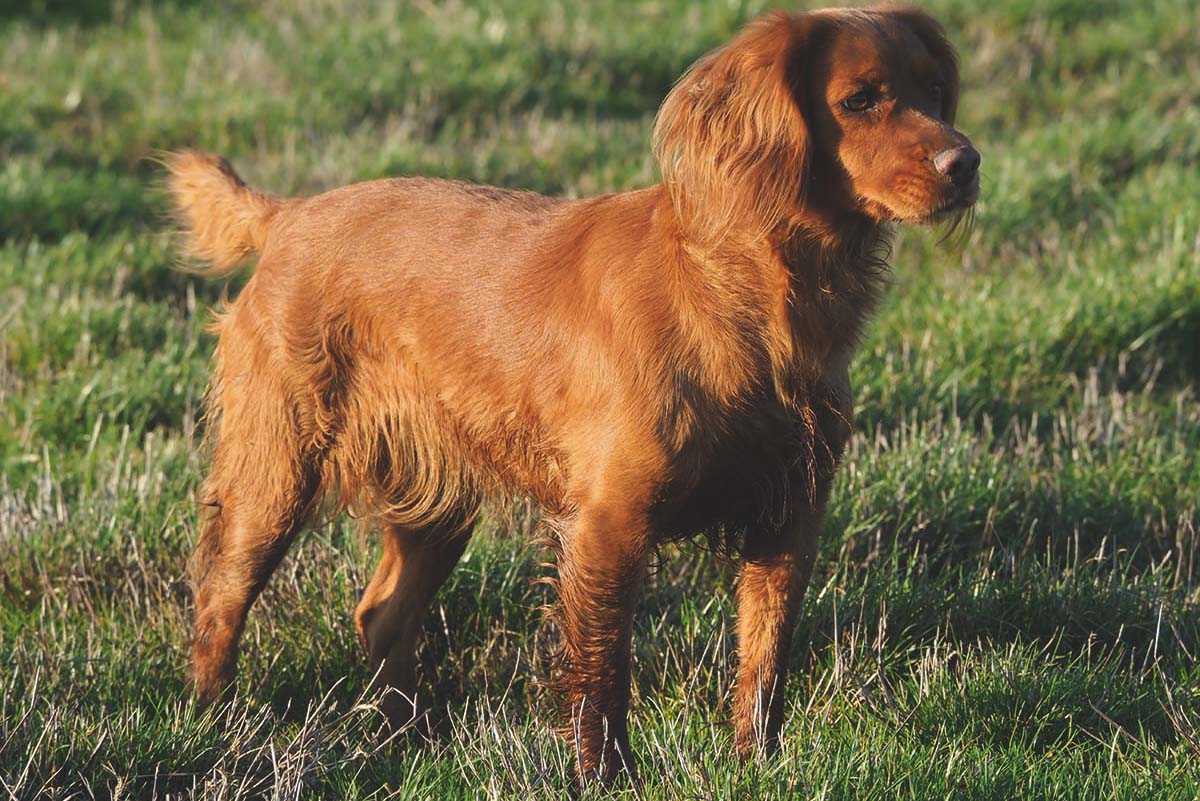Choosing a stud dog
The decision to have a litter from your gundog bitch is not one to be take lightly. It's essential when choosing a stud dog to consider bloodlines, health and conformation. The casual mating with "the nice dog up the road" is too often a recipe for disaster, warns Tony Jackson

Who should sire your gundog puppies?
If you’re thinking about breeding from your gundog bitch you need to think carefully, particularly when choosing a stud dog. I went through this process a few years ago with my six year old yellow Labrador bitch, Jodie, and here’s what I discovered from my research.
A potential stud dog
I knew Margaret Allen, whose Tanderswell line and kennels have achieved distinction in the working gundog and field trial world. Her top dog, Cedar, a black Labrador with all the right credentials, clear eyes and a hip score of 3:4, was a potential suitor for Jodie, who scored 3:3 and also had clear eyes.
Margaret liked the look of Jodie, we examined pedigrees and introduced the pair. The result was eight healthy puppies – five yellow and three black. I kept a yellow dog, and the rest went to working homes.
What to look for in a gundog’s pedigree certificate
A reputable gundog breeder should provide the gundog puppy’s pedigree before you make a commitment to buy. This is because…
Gundog bloodlines
When choosing a puppy or a stud dog, don’t be blinded by a famous name in a dog’s pedigree. Joe…
Here’s how to ensure your breeding is as successful as my experience.
Margaret Allen advises:
- Temperament is paramount
- You must ensure the dog has been tested for hereditary conditions that may affect the breed.
- Be aware that Labradors and other retrievers can have problems with elbows, hips and eyes.
- I have my dogs X-rayed and scored for hips and elbows when they are just over a year old, and eyes are tested for the first time at around the same age.
- You can also DNA test retrievers and spaniels, which will show if an animal is a carrier of PRA (Progressive Retinal Atrophy), EIC (Exercise Induced Collapse) and other conditions including CNM, a general muscle weakness.
- With bloodlines, a dog to conform to the breed standard because they were drawn up by shooting people who knew what a good gundog should look like in terms of coat, conformation and build.
- An outstanding dog will be repeated in the pedigree for a reason. I don’t mind a splash of show blood if it comes from a line whose owners have trained the animal to a reasonable standard.
- The dog’s temperament must be bold, but not over the top. It should not be nervous, but sensitive dogs are easier to train; nor does it need to be over-affectionate. You want it active, athletic, with a good nose, a soft mouth, quiet, and to love retrieving.
Not just putting two same-breed dogs together
Simon Tyers runs Hawcroft Gundogs training kennels in Staffordshire. Simon has been training and handling gundogs for more than 30 years during his time as a gamekeeper and falconer and specialises in working cocker spaniels. He says: “We take a great deal of time and consideration when either choosing a suitable stud dog for one of our own bitches, or when advising one of the many clients who wish to use one of our stud dogs. It’s not just a case of putting two dogs of the same breed together to produce a litter purely to make a little money (as is sometimes the case, especially with popular breeds such as the modern working cocker).
“Firstly we will always view the bitch’s pedigree then consider size and type, temperament, good points and, more importantly, any bad points or weaknesses. With this knowledge to hand we can then suggest the dog we feel is suitable. Breeding is about strengthening and improving the breed and bloodlines, and also maintaining the true cocker size and style. Fortunately we have no serious health issues within the working cockers, and many offspring from our line have been eye tested and hip and elbow scored to satisfy many of the countries to which we export.
“When it comes to matching the right pedigree, then close line breeding is not always advisable, but to maintain the true type of cocker and to retain positive attributes, some similar lines are advisable. Field trial stud dogs have proved to be the best at what they are bred to do and some field trial champions should feature throughout the pedigree. Most breeders find that with good FTCh lines, their offspring are very intelligent, trainable and make wonderful shooting dogs and companions.”
Let your eye be the judge
David Lisett says: “When it comes to breeding you must be honest about the bitch you are breeding from and list all her positive and negative points. This will help when choosing a stud dog to enhance and embrace the points noted. Consider what type of puppy you are seeking to breed and what its main job will be. Note all the qualities you would like in a puppy, but keep your expectations in check.
“You should seek to breed a dog that has natural ability. If it has a natural flair when using its nose and the wind to find game, then that makes training much easier. A good temperament means the dog is more adaptable in training, especially when you make mistakes. Too soft a temperament can lead to all sorts of problems, especially if your dog gets confused during training. Too hard a temperament can lead to a dog being self-employed and unmanageable. The perfect dog should be intelligent, willing to please and work as part of a team.
“Spaniels should be able to work all day in any sort of cover and be athletic enough to jump walls, swim and be ready for more work the next day. As far as confirmation is concerned, beauty is in the eye of the beholder and colour or size never make a bad dog, as long as it is fit for purpose.
“When choosing a stud dog, I am a great believer in letting your eye be the judge. When looking at a spaniel pedigree I pay more attention to the mother’s side as I feel the bitch has more influence on the outcome of the mating.”
What should you expect to pay for gundog stud fees?
The price of a stud fee reflects the standard of the sire you’ve chosen for your bitch – the better it is, the more you can expect to pay for a mating.
If the dog you have in mind is, say, a well known Field Trial champion, then the price could be up to £1000.
Remember that if your bitch is of good stock too then the price of the resultant pups will reflect the stud charge. Bear in mind as well that the owner of the sire might ask to have the pick of the litter, rather than a stud fee in cash.
When looking at the price of a puppy, take into account the amount of money spent on stud fees followed by feed costs, worming then veterinary bills associated with hips/eyes/and elbow scores to pay for.
Sometimes you might see a dog working in the field that you like the look of and think would make a good sire as long as it passes hip scores and the like. If everything is okay then a litter out of this dog could be a cheaper option.
A good rule is to find a dog with good field trial blood lines as this will always sell the resultant pups.










